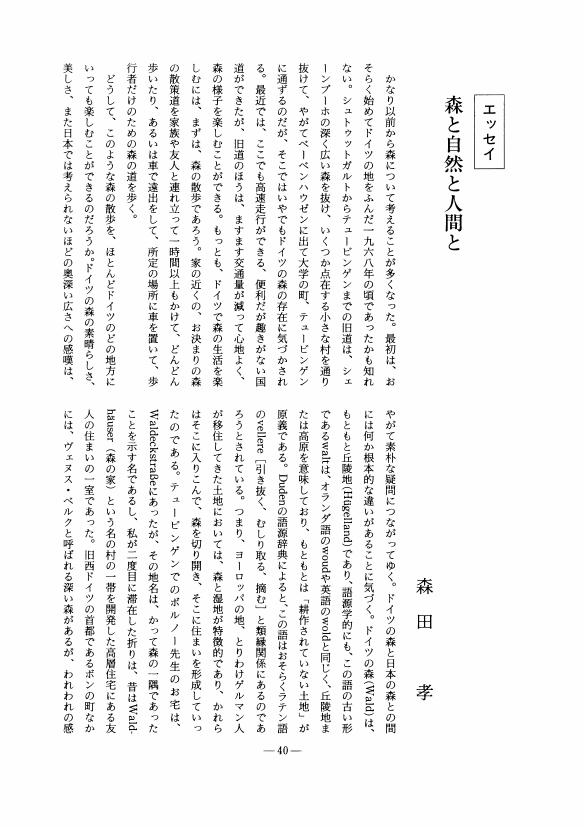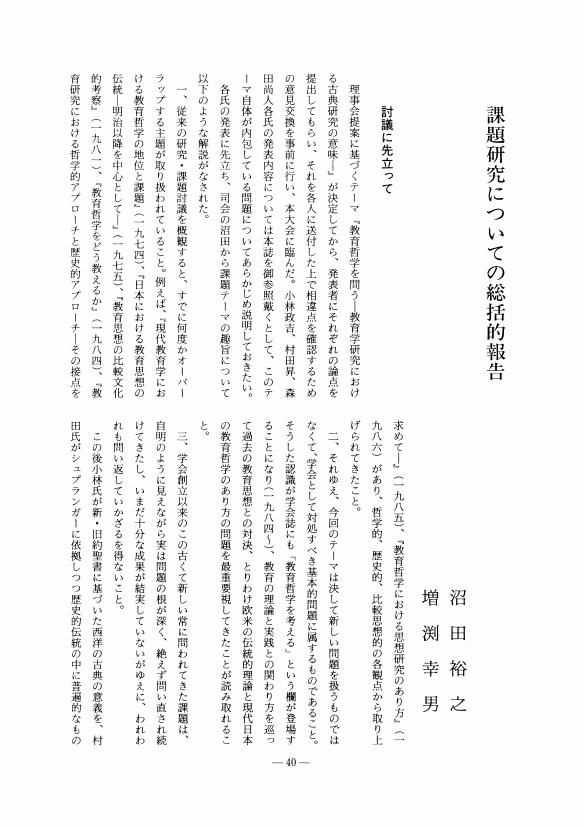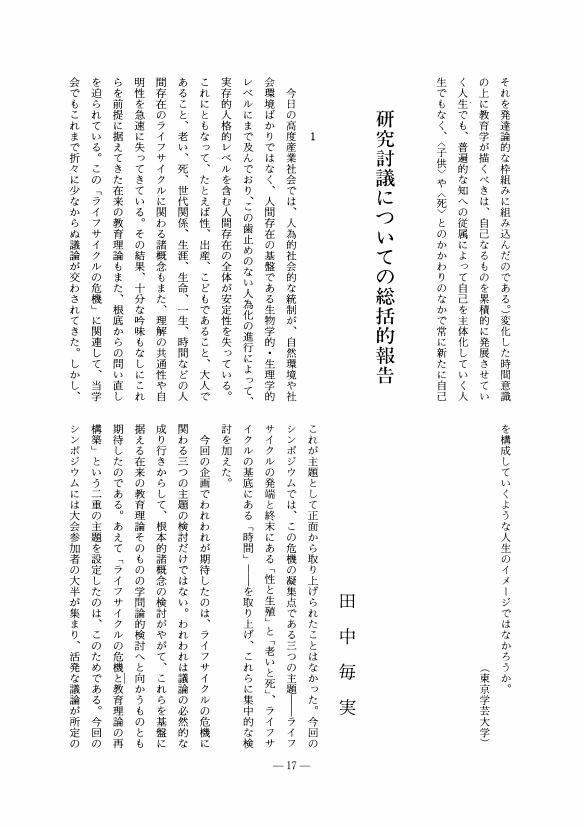1 0 0 0 OA 教育的行為概念の身体論的再構成 教育学における身体論的アプローチの可能性
- 著者
- 矢野 博史
- 出版者
- 教育哲学会
- 雑誌
- 教育哲学研究 (ISSN:03873153)
- 巻号頁・発行日
- vol.1994, no.70, pp.26-39, 1994-11-10 (Released:2010-01-22)
- 参考文献数
- 24
The purpose of this paper is to reconstruct the concept of “Educational Conduct” by overcoming the typically-modern dualistic thinking such as subject/object, from the point of view of “Body Theory.” In view of this purpose, the present author takes the concept of educational conduct as one of “teaching-learning” relationship, and analyzed the concept from the points of view : namely, (1) in reference to the question of how we should think about children's “experience”; (2) in reference to the question of what goes between the plan of teaching and the actual performance.Through these considerations, the author has arrived at a suggestion which prohibits us, who overlap the border between subject/object, from making a universal judgment by using only one standard. On that basis we are required to so act that our sense of judging horizons be continuously decentralized.
1 0 0 0 OA 森と自然と人間と
- 著者
- 森田 孝
- 出版者
- 教育哲学会
- 雑誌
- 教育哲学研究 (ISSN:03873153)
- 巻号頁・発行日
- vol.1994, no.70, pp.40-50, 1994-11-10 (Released:2009-09-04)
1 0 0 0 OA 教育哲学を考える
- 著者
- 岡田 渥美
- 出版者
- 教育哲学会
- 雑誌
- 教育哲学研究 (ISSN:03873153)
- 巻号頁・発行日
- vol.1994, no.70, pp.51-54, 1994-11-10 (Released:2009-09-04)
1 0 0 0 OA 影山礼子著『成瀬仁蔵の教育思想-成瀬的プラグマティズムと日本女子大学校における教育』
- 著者
- 鈴木 美南子
- 出版者
- 教育哲学会
- 雑誌
- 教育哲学研究 (ISSN:03873153)
- 巻号頁・発行日
- vol.1994, no.70, pp.55-60, 1994-11-10 (Released:2009-09-04)
1 0 0 0 OA 課題研究についての総括的報告
- 著者
- 沼田 裕之 増渕 幸男
- 出版者
- 教育哲学会
- 雑誌
- 教育哲学研究 (ISSN:03873153)
- 巻号頁・発行日
- vol.1994, no.69, pp.40-43, 1994-05-10 (Released:2009-09-04)
1 0 0 0 OA <因果プラン>論からみた教育目的の機能 N.ルーマンのシステム理論を中心として
- 著者
- 山名 淳
- 出版者
- 教育哲学会
- 雑誌
- 教育哲学研究 (ISSN:03873153)
- 巻号頁・発行日
- vol.1994, no.69, pp.44-56, 1994-05-10 (Released:2009-09-04)
- 参考文献数
- 30
This paper focuses on the German Sociologist N. Luhmann and offers one possibility of the theoretical problem structure in relation to the purpose of education. Luhmann, already in his early research, while not seeking a quality of objective 'truth' in causality explanations, but rather supposing that they do not possess such a quality, presents a theoretical stance which permits questioning the hypothetical, doubtful connection and the function of the purpose attached to it. The purpose of this paper is to apply this to pedagogial discussion by making use of the concept of the 'causality plan'.Here, it will be confirmed that the transformation of the other, in spite of following a non-causal process, in the educational activity, must apply a subjective causal hypothesis (causal plan), and in addition, that the purpose by which this is chosen as a prerequisite, works by applying the strategy of a 'reducation of complexity'. Furthermore, it is confirmed that this way of thinking is characterized by a 'decentralization of purpose argumentation', quite alien to the tradition of German pedagogy.
1 0 0 0 OA 超越論的批判の視角からみた「ポストモダン」の教育学的位相
- 著者
- 土戸 敏彦
- 出版者
- 教育哲学会
- 雑誌
- 教育哲学研究 (ISSN:03873153)
- 巻号頁・発行日
- vol.1994, no.69, pp.57-70, 1994-05-10 (Released:2009-09-04)
- 参考文献数
- 33
Das Schlüsselwort der 'Postmoderne' beinhaltet eine uneinheitliche Pluralität. Dabei ist die Postmoderne' keine Verneinung der Moderne, sondern deren Radikalisierung.Die verschiedenen Richtungen der Pädagogik der letzten Jahre in Deutschland gehoren fast alle zur Moderne. Eine davon ist auch die tranzendentalkritische Pädagogik, aber die Pädagogik W. Fischers darin, insofern sie in jeder Pädagogik 'Metaphysik' identifizieren will, geht bis an die Grenze der Moderne und ist damit auf den Standpunkt von Pluralität hin ausgerichet. Der Kernpunkt seiner Ansicht diirfte darin liegen, daß für Erziehung und Bildung die Einstellung, nur sich selbst als das einzig Legitime und Endgültige zu betrachten, nicht zutreffend ist.In der 'Postmoderne' gewahrt man eine gewisse Doppeldeutigkeit hinsichtlich der Aufgabe der Erziehung : Verstoß gegen die Erziehung überhaupt einerseits and Befreiung der Erziehung aus den Fesseln der neuzeitlichen Ieen andererseits. Einen solchen Standpunpkt ruft die transzendentale Kritik hervor, aber sie steht immer in der Versuchung, sich zu verabsolutieren. Andererseits läuft die 'Postmoderne' stets Gefahr, das Moment der transzendentalen Kritik zu verlieren. Nur wenn man beides vermeidet, gibt es eine Moglichkeit, daß die transzendentale Kritik und das 'Postmoderne' Denken neue Aspekte in der Pädagogik eroffnen konnen.
1 0 0 0 OA ハンナ・アレントの統合教育批判 アメリカ合衆国における公民権問題の文脈で
- 著者
- 小玉 重夫
- 出版者
- 教育哲学会
- 雑誌
- 教育哲学研究 (ISSN:03873153)
- 巻号頁・発行日
- vol.1994, no.69, pp.71-84, 1994-05-10 (Released:2009-09-04)
- 参考文献数
- 43
How we can consider the relation between diversity and integration in public education, is a very serious question in contemporary U. S. A. Hannah Arendt is one of the most important thinkers who dealt with this problem. Focusing on the context of the Civil Rights Problem in the 1950ies, I elucidate her critical thought on integrated education. In doing so, I try to draw out the specific viewpoint on the public character of education which is entirely different from the liberal viewpoint.Hanna Arendt criticized the Federal decision to start integration in the public schools. For her, the validity of equality is clearly restricted to the political realm. Hence, equality should not be extended to the social realm. She also warned that, by abolishing the authority of the adults, progressive education might implicitly deny their responsibility for the world into which they have borne their children.Her critical thought on integrated education raises an important viewpoint on the public character of education in which minorities can exist without assimilating to the dominant culture.
- 著者
- 鈴木 幹雄
- 出版者
- 教育哲学会
- 雑誌
- 教育哲学研究 (ISSN:03873153)
- 巻号頁・発行日
- vol.1994, no.69, pp.85-98, 1994-05-10 (Released:2009-09-04)
- 参考文献数
- 40
By clarifying G. Otto (“Kunst als Prozeß im Unterricht”, 1969) as he deals with the problem of how to conceptualize structurally the problem of formative art and education, the task of art pedagogy is realistically approached, i. e. how the young through art education are lead into the world; thus the foundations of art pedagogy are established.At the time when they were established during the latter half of the 1960ies, Otto adopted the viewpoint of production/expression and the theory of the structure of art education (Gestaltungslehre) from the art pedagogue of the Weimar period (1932), A. Erhardt, and through Erhardt he learned about the practice and the theory of Bauhaus. The viewpoint and the theory consisted in 'material/raw material-experiment-montage as the grammar of production/expression.On the basis of this viewpoint and this logic, he developed the following theory of art pedagogy : The meaning of art education can be interpreted as the problem of experimental/inquisitive search in the process of discovery and production. Through this discovery and search the young discover their own expression and a widening of that expression.This paper examines the structure of art pedagogy (“Gestaltungslehre, ” 1932) as an enquiry into Otto's art pedagogy and its theoretical foundations. At the same time, through this enquiry the following process is clarified, i. e. the process is clarified how by overcoming the blind spot of the art education movement, the viewpoint and the logic of production/expression is prepared in various fields of formative art/design/architecture leading to a reform of the art academies and various arts in the 1920ies.
1 0 0 0 OA 教育学教育を通して、教育と教育学を考える
- 著者
- 長尾 十三二
- 出版者
- 教育哲学会
- 雑誌
- 教育哲学研究 (ISSN:03873153)
- 巻号頁・発行日
- vol.1994, no.69, pp.99-108, 1994-05-10 (Released:2009-09-04)
1 0 0 0 OA 教育哲学を考える
- 著者
- 村田 昇
- 出版者
- 教育哲学会
- 雑誌
- 教育哲学研究 (ISSN:03873153)
- 巻号頁・発行日
- vol.1994, no.69, pp.109-110, 1994-05-10 (Released:2009-09-04)
1 0 0 0 OA 山崎高哉著『ケルシェンシュタイナー教育学の特質と意義』
- 著者
- 大谷 光長
- 出版者
- 教育哲学会
- 雑誌
- 教育哲学研究 (ISSN:03873153)
- 巻号頁・発行日
- vol.1994, no.69, pp.111-116, 1994-05-10 (Released:2009-09-04)
1 0 0 0 OA ライフサイクルの危機と教育理論の再構築 老いと死の問題視角から
- 著者
- 中村 清
- 出版者
- 教育哲学会
- 雑誌
- 教育哲学研究 (ISSN:03873153)
- 巻号頁・発行日
- vol.1994, no.69, pp.1-5, 1994-05-10 (Released:2009-09-04)
- 被引用文献数
- 1
1 0 0 0 OA 出産と性の視点から
- 著者
- 森田 伸子
- 出版者
- 教育哲学会
- 雑誌
- 教育哲学研究 (ISSN:03873153)
- 巻号頁・発行日
- vol.1994, no.69, pp.6-11, 1994-05-10 (Released:2009-09-04)
- 参考文献数
- 9
1 0 0 0 OA ライフサイクルと時間意識
- 著者
- 今井 康雄
- 出版者
- 教育哲学会
- 雑誌
- 教育哲学研究 (ISSN:03873153)
- 巻号頁・発行日
- vol.1994, no.69, pp.12-17, 1994-05-10 (Released:2009-09-04)
1 0 0 0 OA 研究討議についての総括的報告
- 著者
- 田中 毎実
- 出版者
- 教育哲学会
- 雑誌
- 教育哲学研究 (ISSN:03873153)
- 巻号頁・発行日
- vol.1994, no.69, pp.17-21, 1994-05-10 (Released:2009-09-04)
1 0 0 0 OA 教育哲学を間う-教育学における古典研究の意味- 旧新約聖書から学ぶ
- 著者
- 小林 政吉
- 出版者
- 教育哲学会
- 雑誌
- 教育哲学研究 (ISSN:03873153)
- 巻号頁・発行日
- vol.1994, no.69, pp.22-28, 1994-05-10 (Released:2010-01-22)
- 参考文献数
- 10
1 0 0 0 OA 教育学における古典研究の意味
- 著者
- 村田 昇
- 出版者
- 教育哲学会
- 雑誌
- 教育哲学研究 (ISSN:03873153)
- 巻号頁・発行日
- vol.1994, no.69, pp.28-33, 1994-05-10 (Released:2009-09-04)
- 参考文献数
- 5
1 0 0 0 OA 教育学における古典研究の意味
- 著者
- 森田 尚人
- 出版者
- 教育哲学会
- 雑誌
- 教育哲学研究 (ISSN:03873153)
- 巻号頁・発行日
- vol.1994, no.69, pp.34-39, 1994-05-10 (Released:2009-09-04)
- 参考文献数
- 16
1 0 0 0 OA 長井和雄著『言語力形成の論理』
- 著者
- 今井 重孝
- 出版者
- 教育哲学会
- 雑誌
- 教育哲学研究 (ISSN:03873153)
- 巻号頁・発行日
- vol.1993, no.68, pp.72-75, 1993-11-10 (Released:2009-09-04)














